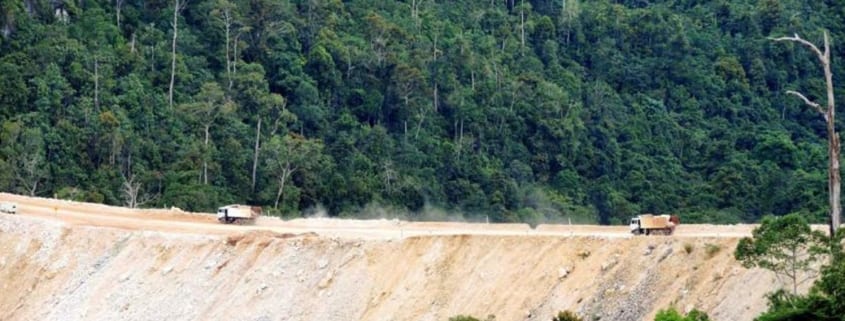Business in Key Biodiversity Areas: Minimizing the Risk to Nature
Gland, Switzerland, 17 April 2018 (IUCN) – A roadmap for businesses operating in some of the most biologically significant places on the planet has been issued today by the Key Biodiversity Area Partnership involving 12 of the world’s leading conservation organisations – including IUCN, International Union for Conservation of Nature.
The report, Guidelines on Business and KBAs: Managing Risk to Biodiversity, outlines steps that businesses can take to actively safeguard biodiversity and avoid contributing to its loss. It recommends businesses of all sizes and across all sectors to adopt 15 guidelines to better manage their direct, indirect and cumulative impacts on places deemed critical for the conservation of species and ecosystems worldwide, known as Key Biodiversity Areas (KBAs).
The report addresses issues such as avoidance of impacts, limits to biodiversity offsets, as well as financial guarantees and corporate reporting. It guides businesses in managing the potential losses and other risks associated with their negative impact on biodiversity, including potential impacts on access to financing and increased company exposure to negative press.
“These new guidelines will help businesses protect the most important natural places on our planet, and so preserve the natural resources they so strongly depend on,” says Inger Andersen, IUCN Director General. “By managing their impacts on nature, businesses deliver positive conservation results, helping address the escalating crisis of biodiversity loss.”
The report and associated website aim to help businesses demonstrate good environmental practice and compliance with voluntary sustainability standards or certification schemes. It also explains how companies operating in KBAs can make a positive contribution to biodiversity by investing in conservation actions and sharing relevant information about the KBAs, including data collected in Environmental Impact Assessments, baseline studies and monitoring activities, with the KBA Partners. Its aim is to assist governments in authorization decisions related to business operations.
“It is our hope that companies and governments will embed these guidelines into their environmental policies, voluntary sustainable standards, financial safeguards and regulations,” says Patricia Zurtita, CEO of Birdlife International. “But we also need other actors – local communities and policy makers, civil society and scientists – to hold business accountable and ensure that the unique biodiversity that defines Key Biodiversity Areas is safeguarded for all”.
Following the adoption in 2016 of a global standard for the identification of KBAs, the KBA Partnership was created to map, monitor and conserve the areas. More than 15,000 KBAs have been identified so far, many of which currently support commercial activities, such as farming, fisheries, forestry and mining. Although the global KBA network does not yet cover all geographical regions or species groups, the KBA Partnership is working to fill these gaps.
“For the first time the conservation community has come together to use standard criteria to identify the most important sites for conservation of species and habitats on the planet,” says Dr Andrew Plumptre, Head of the Key Biodiversity Areas Secretariat. “Ideally, businesses and governments should avoid any harmful activities at these sites. However, if developments are to go ahead, then this report provides crucial advice on how to minimise negative impacts on the species and habitats for which KBAs are important.”
“The Tiffany & Co. Foundation is proud to support IUCN in this important effort to protect some of the world’s most biologically rich and diverse places,” says Anisa Kamadoli Costa, Chairman and President of The Tiffany & Co. Foundation, which funded the project. “These guidelines provide an important roadmap for businesses committed to advancing the long-term preservation and stewardship of the Earth’s natural resources, which all of society depends on.”
Notes to editors
Guidelines on Business and KBAs builds on input provided at an end user consultation workshop held in Gland, Switzerland, from 4 to 5 July 2016, and during a public consultation from 2 December 2016 to 17 March 2017.
A Global Standard for the Identification of Key Biodiversity Areas was adopted by IUCN in April 2016 and launched at the IUCN World Conservation Congress in September of that year. It comprises a set of globally standardised criteria for the identification of KBAs worldwide. It establishes a consultative, science-based process for KBA identification, founded on the consistent application of global criteria with quantitative thresholds that have been developed through an extensive consultation exercise spanning several years.
About the KBA Partnership
The KBA Partnership is made up of 12 of the world’s leading international nature conservation organisations. In addition to IUCN and Birdlife International, this includes: Amphibian Survival Alliance, Conservation International,Critical Ecosystem Partnership Fund, Global Environment Facility, Global Wildlife Conservation, NatureServe, Rainforest Trust, Royal Society for the Protection of Birds, Wildlife Conservation Society and WWF.
The KBA Partnership aims to enhance global conservation efforts by systematically mapping internationally important sites and ensuring that scarce resources are directed to the most important places for nature. The impact of this vital conservation work will be enhanced by promoting targeted investment in conservation action at priority sites.
www.keybiodiversityareas.org/kba-partners
For more information or to set up interviews, please contact:
Ewa Magiera, IUCN Media Relations, Ewa.Magiera@iucn.org, +41765053378




